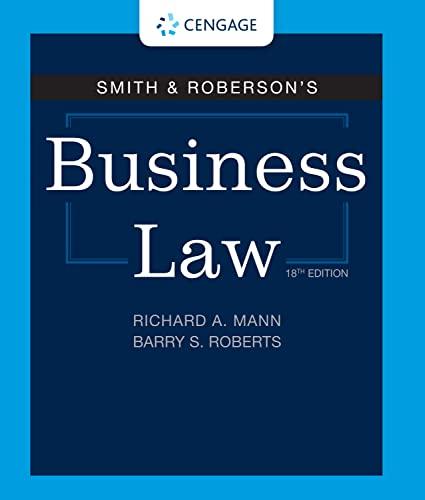Question
Why is civil procedure important to society? What values or goals do the rules of civil procedure attempt to further? Is it possible to fulfill
Why is civil procedure important to society? What values or goals do the rules of civil procedure attempt to further? Is it possible to fulfill all values and goals completely? Why or why not? Who decides which goals and values will be met in a civil justice system, and how can we decide a goal or value has been achieved "enough"? How would you describe ADR and what is its role in the civil justice system? What are some benefits to using ADR? Some disadvantages? What are some of the ADR methods that people might use to resolve a dispute? What distinguishes those processes from one another? How might the status quo bias affect perception of the legitimacy or usefulness of these methods? Are there any restrictions on which ADR process parties to a dispute may voluntarily elect to utilise? What is the difference between "rights-based" dispute resolution and "interest-based" dispute resolution? What are the advantages and disadvantages of each? What is the difference between positional negotiation (also called adversarial or "hard" bargaining) and interest-based negotiation? Note that these styles can also appear in mediation, which can be considered "negotiation plus" (ie, negotiation plus a third party) Identify the interests in the following hypotheticals. Remember interests can be anything - financial, personal, professional, reputational, community-based, etc. Hypothetical 1 Megatron Co. bought a supply of widgets from We 'R Widgets (WRW), a family-run business with extra- special unique handmade widgets. Megatron's order constitutes 80% of WRW's entire production capacity. WRW is having difficulty obtaining raw materials due to COVID-19. Megatron's order is late, and it is threatening to sue WRW and/or terminate the contract. Hypothetical 2 Two parents are fighting over the custody of their child, who was adopted by both of them from another country two years ago. One parent has a job as a highly paid lawyer and has paid the vast majority of the household bills; the other parent works as an artist, which provides a much lower income, and has had primary responsibility over the running of the household, due to the more flexible hours, though the child has been in day care since the child was six months old to give the artist time to work. Both parents want primary custody of the child. What are the advantages and disadvantages of online dispute resolution (ODR)? What special challenges arise with ODR as a matter of procedure? Court Annexed Mediation: For Discussion: When can a court refer a matter to mediation? Why might a court refer a matter to mediation even though the parties are opposed to mediating? Once ordered to mediation, can the parties not participate so that the matter is sent back to the court for determination? If a dispute does not settle following mediation and is sent back to court, can statements and disclosures made during the mediation be used as evidence? Could the mediator be called as a witness? Costs of litigation: Required Reading: KLVM 4th ed; pages119-124 (costs of litigation [3.10-3.70]). KLVM 4th ed; pages 136-152 (lawyers and costs [3.220-3.330]). For Discussion: Why are litigation costs, and the control of those costs, a big issue for discussion and litigation reform? How does the Civil Procedure Act 2005 (NSW) seek to address the issue of costs? How can judges address costs related issues? How does Zanella v Madden illustrate the court's approach to litigation costs under the CPA? Security for costs: Required Reading: KLVM 4th ed; Chapter 3 (pages 159-170). For Discussion: What are the two statutory sources of authority for the court's power to order security for costs? Which party may apply for a security for costs order? (Against which party is the order made?) What is the purpose of a court ordering security for costs? Will a court ever be required to issue a security for costs order? Can a court issue a security for costs order even if neither of the statutory sources for authority has been satisfied? Lawyers' ethical obligations to the process: Required Reading: KLVM 4th ed; page111-112 [2.270], page 55-57 (NSW Model Litigant Policy [1.390]) For Discussion: What is the primary source of lawyer ethical requirements and obligations in NSW?
Where should a lawyer's ethical duties and obligations be directed? Is a lawyer obligated to follow all client instructions?
Step by Step Solution
There are 3 Steps involved in it
Step: 1

Get Instant Access to Expert-Tailored Solutions
See step-by-step solutions with expert insights and AI powered tools for academic success
Step: 2

Step: 3

Ace Your Homework with AI
Get the answers you need in no time with our AI-driven, step-by-step assistance
Get Started


